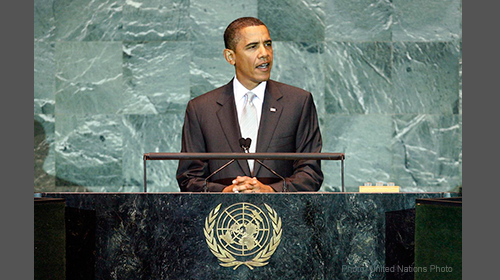
Speaking to the United Nations General Assembly in New York this week, President Obama took a moment to reflect on America's domestic human rights record and the situation in Ferguson.
I realize that America's critics will be quick to point out that at times we too have failed to live up to our ideals; that America has plenty of problems within our own borders. This is true. In a summer marked by instability in the Middle East and Eastern Europe, I know the world also took notice of the small American city of Ferguson, Missouri – where a young man was killed, and a community was divided. So yes, we have our own racial and ethnic tensions. And like every country, we continually wrestle with how to reconcile the vast changes wrought by globalization and greater diversity with the traditions that we hold dear.
But we welcome the scrutiny of the world – because what you see in America is a country that has steadily worked to address our problems and make our union more perfect.
While it's heartening that the president did not repeat the usual bromide of "American exceptionalism," his words will prove empty unless they are followed by concrete policies that address structural discrimination against people of color – especially practices like racial profiling and targeting minority communities for surveillance. Indeed, there is much more the Obama administration can do to make good on his promise to lead by the power of example at home.
Recently in Geneva, the U.N. Committee on the Elimination of Racial Discrimination held the administration accountable to U.S. obligations to eliminate racial discrimination, made in a treaty ratified by the United States in 1994. Following hearings with a high-level U.S. government delegation, the U.N. committee of independent human rights experts issued a report highlighting the gaps between the administration's stated commitments and the glaring reality of laws and practices that continue to discriminate against racial and ethnic minorities, women, indigenous peoples, and immigrants. The report urges the government to make significant reforms in areas including voting rights; immigration issues, like unaccompanied children and deadly use of force; and criminal justice issues, like racial profiling, police brutality, and disparities in sentencing.
The president also declared that America is "willing to criticize ourselves when we fall short," and that "we hold our leaders accountable… with respect for the rule of law." These are indeed the hallmarks of a healthy democracy, but unfortunately the commitments of this administration have not always matched its actions, especially when considering the issue of transparency and accountability for torture. A current example is the battle between the White House and the Senate Intelligence Committee over redactions to the committee's comprehensive report on the CIA's torture program.
Just as President Obama acknowledged our shortcomings in Ferguson and pledged transparency in investigating the killing of Michael Brown, so too must his administration exercise transparency in disclosing information about the torture our country perpetrated during the Bush administration and hold those responsible accountable.
In November, the United States will appear before the U.N. Committee Against Torture, which will assess U.S. compliance with the international anti-torture treaty the U.S. ratified in 1994. The Obama administration has an opportunity to clearly and credibly demonstrate to the world its firm commitment to torture prohibition, and meet its human rights obligations to fully investigate acts of torture and provide redress to victims. Failure to do so will set a dangerous precedent for future presidents to sidestep accountability for human rights violations and open the door for barbaric abuses to reoccur.
Learn more about human rights and other civil liberty issues: Sign up for breaking news alerts, follow us on Twitter, and like us on Facebook.

